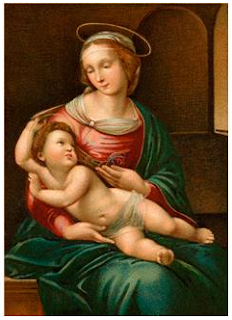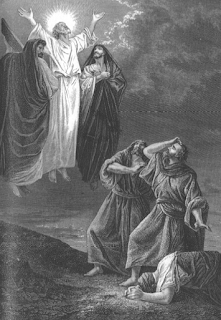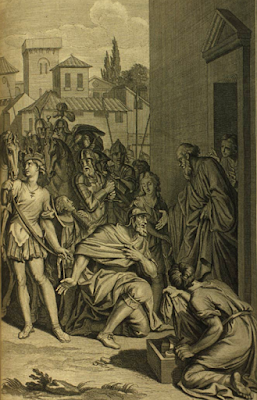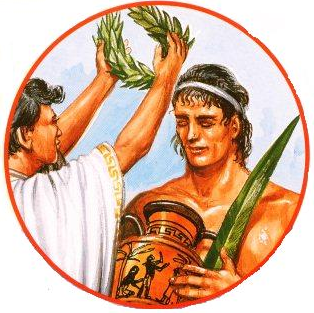"The Empty Tomb"
Illustration from a book by Martin Luther.
TO CHEW ON: "You have answered Me." Psalm 22:21b
This psalm pivots at verse 21. There the speaker (prophetically Jesus, Messiah) comes to the triumphant conclusion "You have answered Me."
Up to that point He has dwelt on the dreadful things that would and did happen as His life spiraled toward death. Today's reading includes the howls of the suggestible crowed insisting Barabbas go free and Jesus die, His pierced hands and feet, the gawking scorn of onlookers, and the dice game for His robe. And then He proclaims, "You have answered Me."
But He died. So we ask, how did God answer Him?
The answer came three days later. As explained by the writer of my Bible's Psalm footnotes: "The resurrection of Jesus was an answer to His prayer and to the agonizing prayer of every sin-laden human soul"- K.R. "Dick" Iverson, New Spirit-Filled Life Bible, p. 702.
That last phrase snags my attention: "...every sin-laden human soul." That includes me. It prompts me to ask: How does Christ's resurrection impact me—and you?
Wayne Grudem devotes an entire chapter to the resurrection and ascension of Jesus in his Systematic Theology. Here are some bits, gleaned from that chapter to answer our question:
How does Jesus' resurrection impact us?
1. We are made spiritually alive.
"When Jesus rose from the dead he had a new quality of life .... When we become Christians our bodies remain as they were .... But in our spirits we are made alive with new resurrection power."
2. The penalty for our sin is paid.
"When Christ was raised from the dead, it was God's declaration of approval of Christ's work of redemption .... There was no penalty left to pay for sin, no more wrath of God to bear, no more guilt or liability to punishment—all had been completely paid for."
3. There will be resurrection bodies for us.
"In calling Christ the 'first fruits' (1 Corinthians 15:20) Paul uses a metaphor from agriculture to indicate we will be like Christ .... Christ as the 'first fruits' shows what our resurrection bodies will be like when, in God's final 'harvest' he raises us from the dead and brings us into his presence" - quotes from Wayne Grudem, Systematic Theology, pp. 614-616.
The rest of Psalm 22 sparkles with the joy of this resurrection answer. Praise God, we can join in Messiah's celebration!
PRAYER: Dear God, "My praise shall be of You in the great assembly .... All the ends of the world shall remember and turn to the Lord, all the families of the nations shall worship before You. For the kingdom is the Lord's and He rules over the nations." Amen (quoting Psalm 22:25, 27-28)
*******
Unless otherwise noted all Scripture quotations are taken from the New King James Version®. Copyright © 1982 by Thomas Nelson, Inc. Used by permission. All rights reserved.
.png)



.png)











